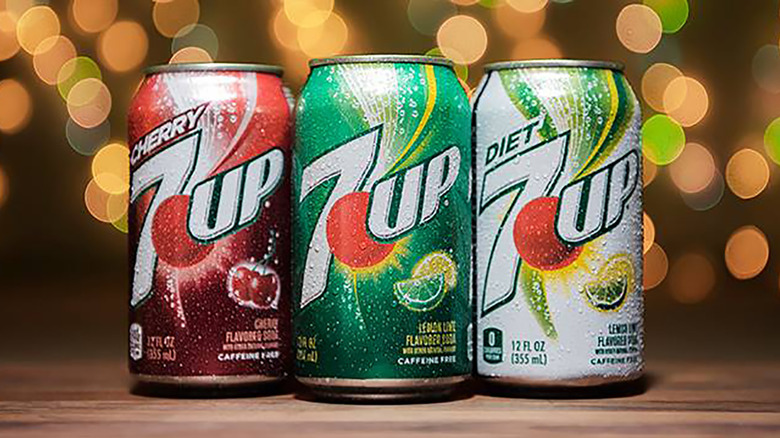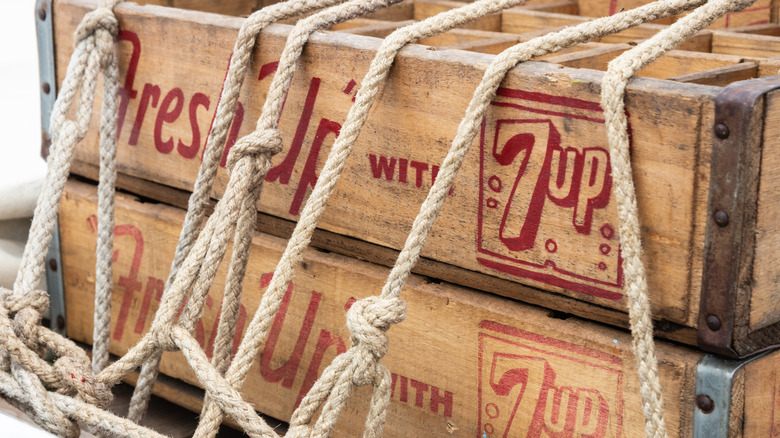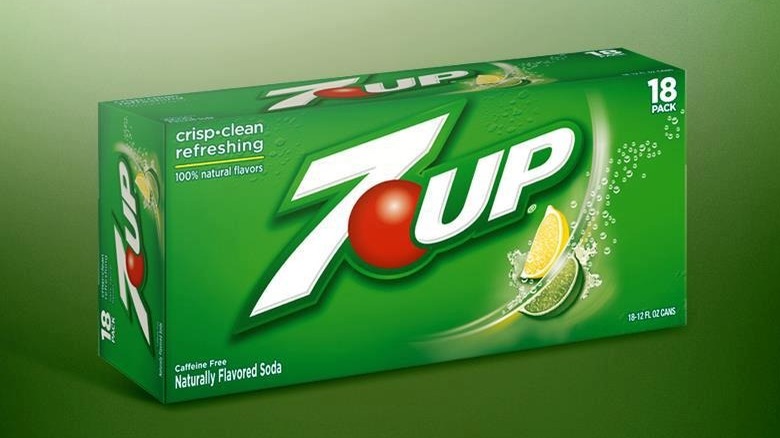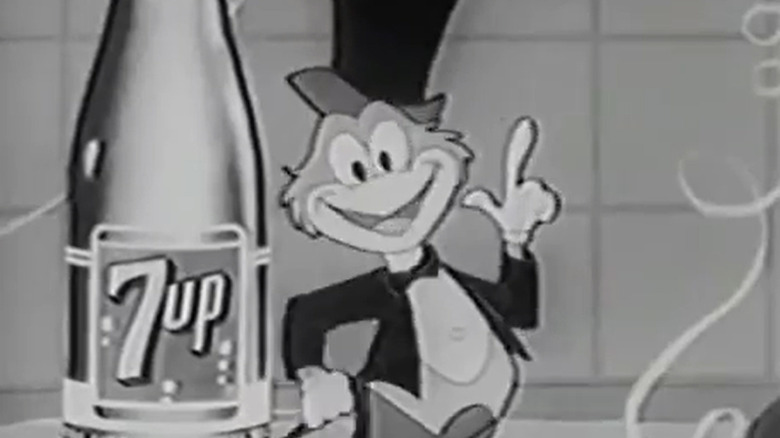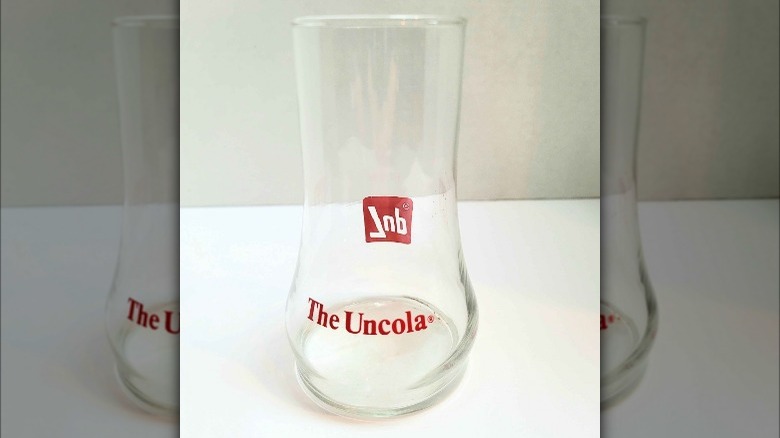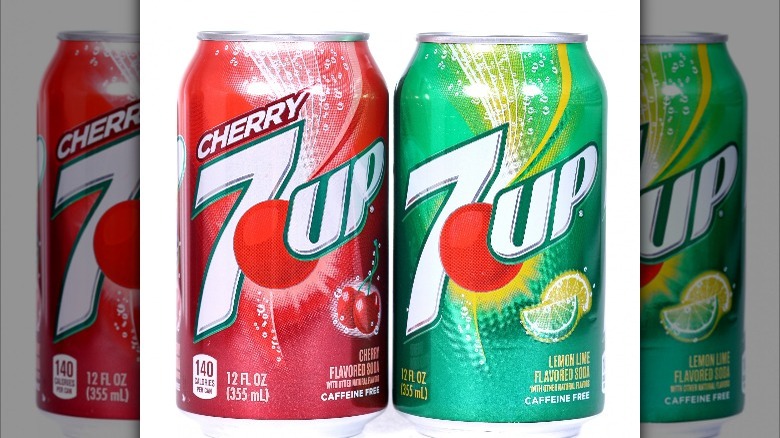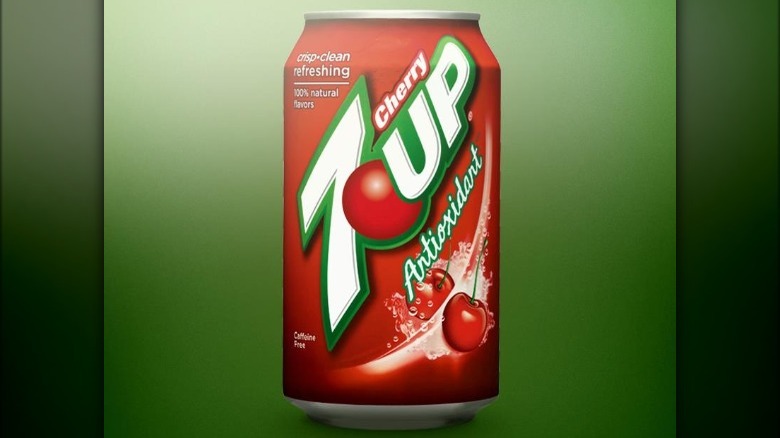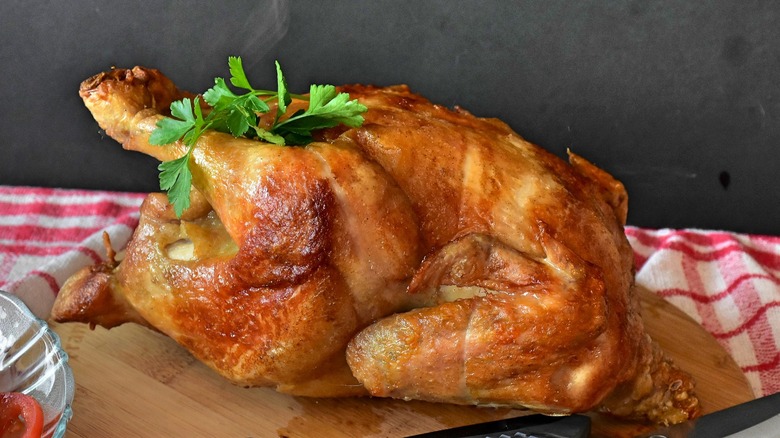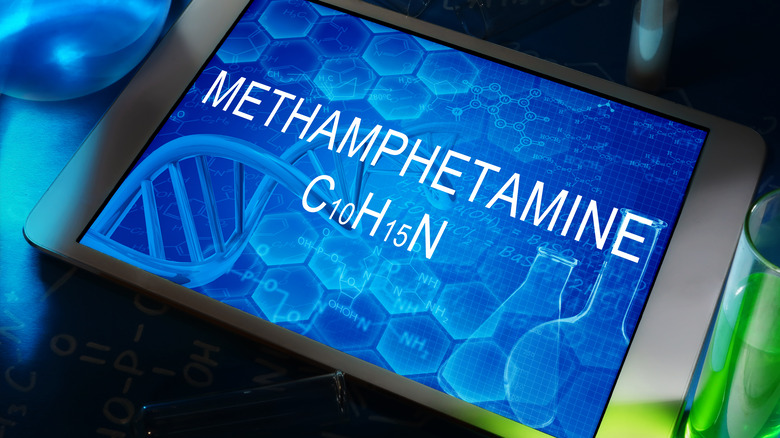The Untold Truth Of 7UP
It can be difficult to stand out when you're part of a large family. Even having a couple of siblings can be enough to take the attention off of you, and that's not taking into consideration nieces, nephews, and cousins. But now imagine if you had to compete with more than 100 family members, and despite ups and downs still held an impressive piece of the spotlight for decades. This in a nutshell is 7UP's story.
Known for its lemon-lime flavor, 7UP is one of more than 125 different beverages manufactured by Keurig Dr Pepper, the eighth-largest food and beverage company in the United States (via Keurig Dr Pepper). However, this wasn't always the case. Prior to 2008, another well-known name in the food industry, Cadbury, owned the Dr Pepper Snapple Group, which manufactured 7UP (via Dr Pepper Snapple Group). With so many coffees, teas, waters, soft drinks, and juices being produced by the same company (not to mention outside competitors like Pepsi and Coca-Cola), it wouldn't be surprising if 7UP got lost in the shuffle. Surprisingly, it hasn't, and remains incredibly popular.
According to Newsweek, 7UP ranked as the 10th-most popular soda in the United States in 2021, earning just shy of $1 billion in sales. The brand's current success is just the latest chapter in the history of this soft drink — a history that spans more than 90 years.
It was invented in 1929
It's impossible to discuss the origin of 7UP without talking about two other sodas: Whistle and Howdy (via The Vintage News). In many ways, they were the precursors to today's 7UP since they were both created by Charles Leiper Grigg. However, both Whistle and Howdy were orange-flavored drinks, and Grigg faced stiff competition from Orange Crush. So, Grigg turned his attention to inventing a lemon-lime soft drink, and in 1929, the first version of 7UP was born.
If you went to a store in 1929 looking for Grigg's lemon-lime soda, you wouldn't find a single bottle labeled 7UP. No, Grigg's original name for his concoction was "Bib-Label Lithiated Lemon-Lime Soda." Quite a mouthful, but there was a reason behind this long name. The original formula for 7UP contained lithium citrate. And as WebMD explains, lithium is a treatment for bipolar disorder because it helps to balance out the brain's chemistry. Grigg emphasized the lithium content of his new drink and claimed that it could be beneficial for customers' moods.
While lithium is used to treat manic episodes, WebMD warns that high amounts of lithium can cause symptoms like seizures, diarrhea, dizziness, and nausea. You don't have to worry about lithium in 7UP these days, as it was banned for use in soft drinks in the U.S. in 1948, and the four products on 7UP's website don't list lithium as an ingredient.
No one knows why it's called 7UP
So, how did Grigg's lemon-lime soft drink go from being called "Bib-Label Lithiated Lemon-Lime Sodas" to 7UP? Oddly, there are many theories but no conclusive answer (via Snopes). For example, some have speculated that 7UP must mean the product is made from seven ingredients. Others believed it was because 7UP came in seven-ounce bottles or because the name "Seven Up" has seven letters in it. But these are just the tip of the iceberg when it comes to the theoretical origins of this soda's name.
According to Snopes, two different theories on how Grigg came up with the name "7UP" are both related to gambling. In one, he won a poker game because of the seventh "up" card he gets from the dealer. In another, he keeps rolling sevens while playing craps. But both gambling theories have one thing in common: Grigg wins a large amount of money, inspiring him to rename his beverage 7UP.
Per Snopes, in addition to the poker and craps theories, there are still two more possible explanations for the name 7UP that have some documented plausibility. One is based on a joking statement by Grigg, who claimed his lemon-lime soft drink was a way to treat the "seven hangovers." And the other, which was mentioned by a previous president and chairman of 7UP, is that Grigg was inspired by the practice of branding cattle, hoping that a small, simple moniker would help consumers remember his beverage.
Disney created a 7UP mascot
Around the same time that Grigg was creating his lemon-lime soft drink, a device that would greatly impact 7UP's fortunes was making its debut on the other side of the Atlantic Ocean. According to History, inventor John Logie Baird introduced the world to his "televisor" machine, which was the very first television, in London in 1926. By the 1950s, television had become not only a major medium for entertainment in the U.S. but also a major vehicle for advertisements.
Per Chicago Tribune, the 7UP Company worked with Walt Disney to create a cartoon mascot to help promote their soda to a mass audience. The result was Fresh Up Freddie, an animated rooster who would enthusiastically sing "Nothing does it like 7UP" (via YouTube). In one of these TV spots, Freddie advises the audience that the most important part of throwing a successful party is 7UP since "everyone likes the fresh, clean taste of 7UP." The commercial also features a live-action segment of people at a party enjoying 7UP while an announcer makes statements like "7UP is the perfect thirst quencher" and "7UP makes all good food taste better."
In addition to creating Fresh Up Freddie, Disney also made 7UP the commercial sponsor of the popular TV show "Zorro." Based on author Johnston McCulley's masked vigilante character, the series ran for two years and exposed both Freddie and 7UP to a wide audience (via D23).
It became the Uncola in the 60s
On the surface, it seems obvious why 7UP would be called the uncola. After all, if you were to put a glass of 7UP next to a glass of Pepsi or Coke, you could easily tell them apart just by their colors. And, of course, lemon-lime soda and cola don't taste the same. But the real reason why 7UP became the uncola had less to do with these differences and everything to do with the counterculture of the '60s.
What's important to remember is the "hippie" movement of the 1960s began because of unrest in the U.S. (via Duke University). This was the same period of time during which the Vietnam War took place, leading young people to advocate for peace. Many of them also became involved in the civil rights movement, seeking an end to segregation. In short, the general attitude of the '60s was that the previous generation had made severe mistakes, so the new generation would be different from their parents. This is what lead the manufacturers of 7UP to brand it as the uncola.
According to Duke, by focusing on how 7UP is different from its competitors, the ads dubbing it the uncola were really saying it was the antiestablishment soft drink. To further connect 7UP with the counterculture movement, the company ran a contest where the winner's artwork would be used to advertise 7UP. The resulting psychedelic billboards encouraged motorists to drink the uncola.
7UP helped raise millions for MDA
While Grigg created the original 7UP formula, another important person in the history of this soft drink was William E. Winter (via Market Screener). Although he technically began working for the company at age 15, he left to join the army and fight in World War II. When he did return, however, he left his mark on 7UP by not only being instrumental to the uncola marketing campaign, but also by making 7UP the first corporate sponsor of the Jerry Lewis MDA Labor Day Telethon.
Created in 1950, the Muscular Dystrophy Association (MDA), raises money to support research on a number of conditions. Of course, the inspiration to begin the MDA was to help those affected by muscular dystrophies, diseases that can result in the breakdown of skeletal muscles (via MDA). However, the Association has expanded to include research for other ailments like myopathies and motor neuron diseases. Beyond Jerry Lewis, the MDA's annual telethon has featured Hollywood stars like Robert DeNiro, Billy Crystal, Jerry Seinfeld, and Betty White, as well as music legends like The Rolling Stones, Tina Turner, Jon Bon Jovi, Aretha Franklin, Gloria Estefan, and Ringo Starr.
It's important to note that 7UP's involvement with the MDA was not a one-off situation. In fact, Market Screener says that at the time of Winter's passing in 2016, the company and the Association had a more than 40-year affiliation during which time 7UP had helped raise millions in donations.
7UP has come in several flavors
While 7UP is known for its lemon-lime taste, that doesn't mean there haven't been quite a few other flavors of this soft drink. Of course, most people are familiar with Cherry 7UP, but the company also released a line of fruit-flavored beverages in 2007 called 7UP Plus, which included not just cherry but also mixed berry and island fruit (via Popular Timelines). For a limited time in 2014, the company released a pineapple/mango-flavored soda called Tropical 7UP, which was re-released in 2015. But as the New Coke fiasco taught the food industry, not every new beverage product is going to be successful.
In 1988, 7Up Gold, a soft drink that was more like ginger ale than traditional 7UP, hit supermarket shelves. Unfortunately, the public was thrown off by a dark caffeinated product with the 7UP logo, and so the 7UP Gold was discontinued. Per Snack History, in 2002, another attempt was made at a caffeinated version of 7UP called dnL (which is 7UP upside down). Although dnL had some serious promotional firepower behind it as a drink sponsor of the 46th Annual Grammy's and "The Lord of the Rings: The Two Towers," it went the way of 7UP Gold and was discontinued.
Popular Timelines says that in addition to 7UP's American products, some 7UP flavors have been available exclusively internationally. These include 7UP Yerbabuena (Colombia), 7UP Mojito Flavour (France, UK, and Ireland), and 7UP Revive (India and Laos).
7UP was sued twice by CSPI
If you're in the food industry, there's an excellent chance you know of the Center for Science in the Public Interest (CSPI). Established in 1971, this consumer watchdog group advocates for changes in the food industry. In some cases, the organization has filed lawsuits against companies, including Frito-Lay, Tropicana, KFC, and Quaker (via CSPI). On two separate occasions, the CSPI has threatened lawsuits against 7UP.
As NBC News reported, the CSPI's first threat against 7UP in 2007 was because of marketing claims that 7UP is "100 percent natural." The issue was that 7UP's list of ingredients includes high fructose corn syrup, which CSPI explains on their website is chemically processed. However, CSPI stopped pursuing the lawsuit after Cadbury-Schweppes agreed to stop marketing 7UP as "all-natural." Although this was enough to keep CSPI from suing 7UP that time, CSPI actually filed a lawsuit against the company a few years later.
According to CBS News, the Dr Pepper Snapple Group (a spin-off of Cadbury) faced a CSPI lawsuit in 2012 because the company promoted Cherry 7UP, Pomegranate 7UP, and Mixed Berry 7UP as containing antioxidants. The antioxidants, however, were not coming from fruit juices, which the products didn't contain, but from the manufacturer adding vitamin E, which is against FDA regulations. The CSPI dropped the lawsuit after 7UP stopped adding vitamin E to its products and removed the antioxidant claim from labels (via CBS News).
Sir Mix-a-Lot was a 7UP spokesman
While the previous marketing campaigns for 7UP emphasized it as a standalone beverage, the company decided to take its advertising in a new and more interactive direction in 2017 (via Dr Pepper Snapple Group). Entitled "Mix it UP a Little" this campaign featured the rapper Sir Mix-a-Lot and promoted how 7UP could be used in cocktails, baking, and cooking.
"I was excited to be a part of this campaign and put my own spin on some 7UP mixers," said Sir Mix-a-Lot, adding that his culinary creations like Bubble Bundt cake would help the public see that 7UP has a wide variety of uses. While normally you wouldn't expect to see Sir Mix-a-Lot experimenting with recipes in a kitchen, the unexpected spokesperson choice was the exact point of the campaign, according to Brett Craig, executive creative director at the advertising agency Deutsch.
In addition to Sir Mix-a-Lot, the campaign also featured online videos of how to use 7UP to make dishes like kimchi and beverages like punch. The company also launched an online recipe generator where visitors could explore both food and cocktail recipes. Even though this campaign has ended, the 7UP website still features recipes for dishes, desserts, and drinks that can all be made using the soda.
7UP can be used in savory recipes
It's widely known that 7UP is a good ingredient for a mixed drink or a possible way to add a little lemon-lime flavor to a dessert. The 7UP website lists recipes for no-bake cheesecake, peach ice cream, and cinnamon rolls that can all be made using 7UP. There are even recipes for pancakes and biscuits that include the soda. But what might not be so obvious is that 7UP can be used in a variety of savory dishes.
7UP can be used in a candied bacon recipe or a chicken marinade, and soft drink is also good for chicken fajitas, guacamole, brisket, garlic porkchops, and carnitas. In addition, 7UP can be used to whip up a type of kimchi, a dish that is usually made from fermented vegetables. However, the 7UP website states that using soda means that this particular kimchi doesn't require fermentation. In fact, the dish only needs to stay in the refrigerator overnight.
In addition to using 7UP as an ingredient, the recipe for 7UP Can Chicken actually turns the soft drink's aluminum can into a cooking tool. The website instructs you to pour a third of the soda out of a can of 7UP, add four cloves of crushed garlic and four sprigs of thyme to the remaining soda, and then place the chicken onto the can so it can cook in an upright position in the oven.
Meth-laced 7UP was found in Mexico
7UP made headlines in 2017 for a very sinister reason. As Snopes reported, tampered 7UP that was laced with methamphetamine was sold in Mexicali, leading to one fatality and at least seven people becoming ill.
At the time of the incident, a spokesman for the Dr Pepper Snapple Group said that the company "owns and licenses the 7UP brand only in the U.S. and its territories" (via Washington Post). He also emphasized that "We do not market, sell or distribute the brand internationally." As a result of the laced sodas, U.S. health authorities issued a travel warning and hospital network Banner Health released a statement in which their Poison and Drug Information Center's medical director advised the public to make sure the seals on foods and drinks were not tampered with or broken.
Snopes says that, beyond warning the public to be vigilant about the seals on products like 7UP, Banner Health also released a checklist of symptoms from ingesting meth-contaminated soft drinks. These included vomiting, an irregular heartbeat, a burning sensation in the abdomen or the esophagus, and breathing issues. In addition, Banner Health cautioned that these symptoms could come on suddenly and advised contacting either the Poison Control Center or 911 if the symptoms were severe.
7UP can be used as plant food
When Fresh Up Freddie was the animated mascot for 7UP, the product's box read, "Fresh Up with 7UP" (via YouTube). However, it's very unlikely that anyone connected to that commercial or slogan (or the inventor of 7UP himself) thought this lemon-lime soda could freshen up a tree. Actor Rob Lowe revealed in 2019 on The Ellen DeGeneres Show that he uses the lemon-lime soft drink to keep his Christmas tree fresh and green (via Delish).
The "911: Lone Star" actor told Ellen, "I'm not really involved in the house, I live in the house, I love the house, but that's [my wife] Sheryl's domain. But when it comes to the Christmas tree, I am all over it. I'm obsessed with it drying out too soon." Specifically, the actor expressed concerns that the pine needles could become flammable if they started drying out and falling off the tree. However, he's found that a combination of 7UP and water keeps evergreens fresher longer.
Although this might sound like another false lifehack, there is evidence to back up Lowe's 7UP claims. Susan Han, a University of Massachusetts Amherst plant physiologist, told Scientific American that the acidity and sugar in 7UP can make it a good plant food (via Live Science). However, she does caution that sugar can encourage microbes to grow in greater numbers, so if you try this trick at home, you might want to also add a few drops of bleach.
